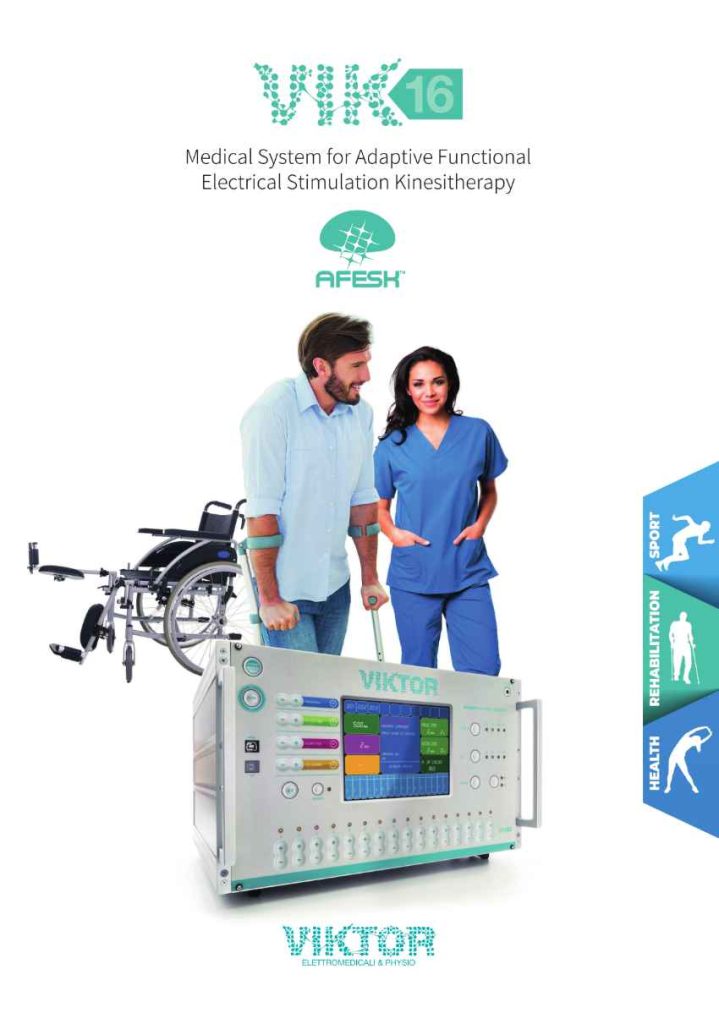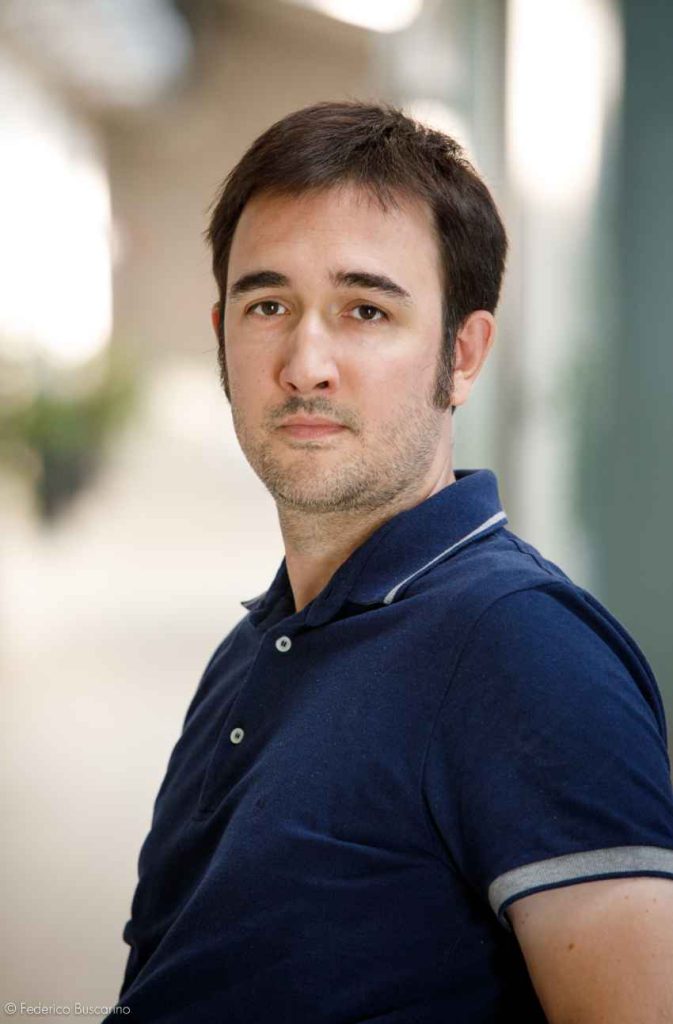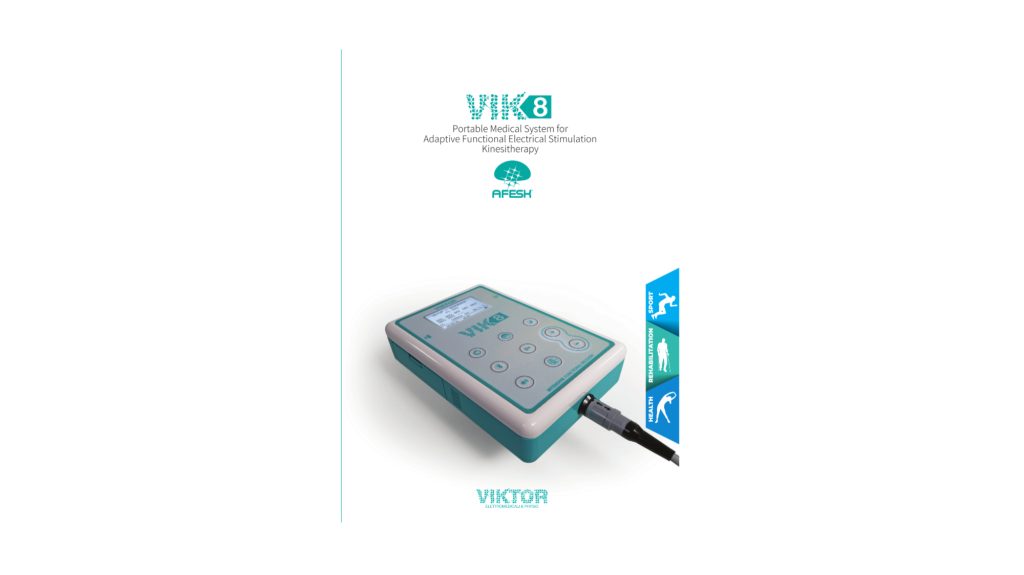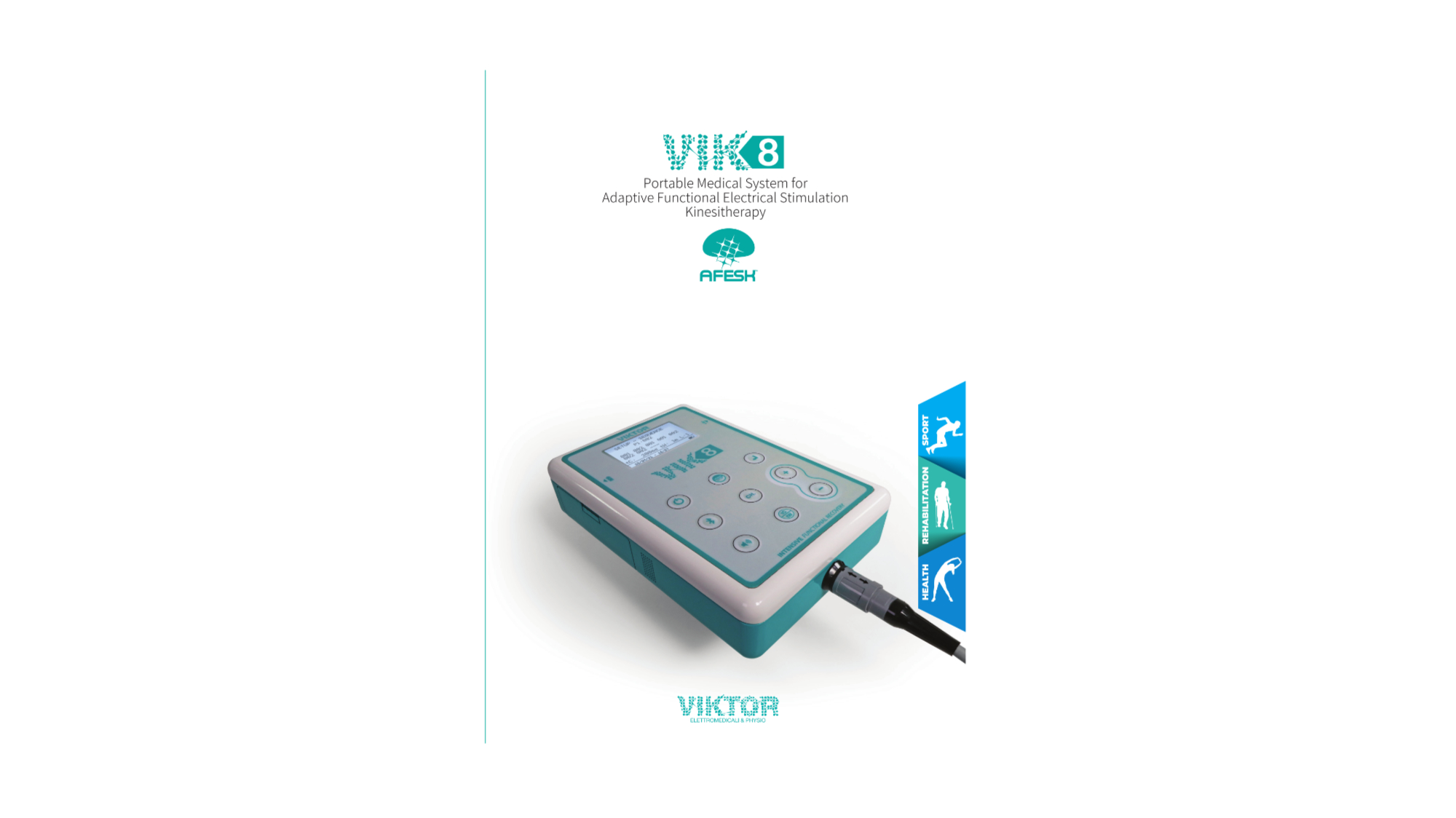VIKTOR is an innovative SME in the Med Tech sector that develops devices and methods with applications in neurorehabilitation (post stroke, CNS and peripheral nervous system damage, MS and neuromotor deficits, silver age) and re-training and training in sports, with possible applications in aerospace as well.
Interview with Guido Gabbrielli, CTO VIKTOR.
A brief description of the company and its activities.
Guido Gabbrielli: Our worldwide certified and patented AFESK™ (Adaptive Functional Electrical Stimulation Kinesitherapy) technology finds application in the VIK16 workstation and VIK8 portable solution; electrical stimuli are delivered to the patient through surface electrodes or our AFESK™ Suit non-invasively.
Our devices can be considered as input enhancers in terms of neurosensory motor information, which flows from the peripheral nervous system to the CNS, creates a well-accepted instructional demand (function by function), and directs neuroplasticity processes in the right direction; perfect synchronization of AFESK™ programs and patient movement is one of the key elements of the whole process.
AFESK™ devices have been shown to restore the possibility of autonomous movement in patients with severe motor dysfunction (e.g., quadriplegia, paraplegia, hemiplegia, stroke) while improving the sports performance of professional and amateur athletes.
The company is headquartered in Milan and has a pilot rehabilitation center, VIKTOR Physio LAB, at Point in Dalmine, Bergamo.
VIKTOR S.r.l. also collaborates with several strategic partners, including research institutions such as the Italian National Research Council (CNR), rehabilitation centers such as Villa Beretta and Domus Salutis, professional associations such as the Associazione Italiana Fisioterapisti (AIFI), and sports centers like MAPEI Sport.
What are the main areas of activity of the company?
G.G: The company’s main areas of activity are:
Neuromotor Rehabilitation: VIKTOR S.r.l. develops and markets disruptive electrostimulators for neuromotor rehabilitation and sports training, focusing on restoring autonomous movement in patients suffering from motor dysfunctions.
The VIKTOR Method is based on stimulating the movement centers of the brain with specific electrical stimuli that trigger the neuronal recovery of the affected body parts.

The company’s solutions are applicable to various conditions, including tetraplegia, paraplegia, stroke recovery, age-related motor issues, corrective orthopedic treatments, sports training, trauma prevention, and functional monitoring during work.
Sports training: VIKTOR S.r.l. applies its technology to enhance the performance of professional and amateur athletes.
The company focuses on improving athletes’ performance and preventing traumas through its neuromuscular stimulation technology.
What’s the news about new products/services?
G.G: VIKTOR S.r.l. plans to expand its product offerings with portable systems adapted for running and cycling to cater to specific sports and patient requirements.
We also intend to enhance our software capabilities by developing specialized libraries to target specific conditions and AI for particular pathologies, a healthcare database, and AI-supported program selection based on physiological functional evaluation.
What are the ranges of products/services?
G.G: VIKTOR S.r.l. offers a range of products and services, including:
AFESK™ Workstations: The company’s flagship technology, AFESK™ (Adaptive Functional Electrical Stimulation Kinesitherapy), utilizes functional electrical stimulation (FES) during exercise for neurological patient rehabilitation.
VIKTOR S.r.l. has developed two AFESK™ workstations:
- VIK16: A 16-channel workstation suitable for professional use in clinics, hospitals, and sports centers.
This system can reproduce, support, and maximize complex cyclical movements such as walking, cycling, and exercises involving the upper and lower limbs.
It is designed for professional use in clinics, hospitals, and sports centers.
The workstation is equipped with acoustic feedback and an integrated AFESK™ sensor that uses artificial intelligence to detect patient movement patterns and automatically adjust the stimulation response to variations.
VIK16 has been successfully tested and used extensively in various facilities, including Villa Beretta, Domus Salutis, and the Italian Association of Physiotherapists.
- VIK8: A portable 8-channel workstation offering similar functionalities to VIK16 but in a more compact and portable form.
The VIK8 is also equipped with acoustic feedback, an integrated AFESK™ sensor with artificial intelligence, and can be used for various exercises.
Rehabilitation Services: The VIKTOR Physio LAB provides tailored neuromotor rehabilitation services for patients with various neurological conditions.
The center, located at the Point Technological Hub in Dalmine, offers private services in neuromotor rehabilitation, professional sports preparation, amateur high-level sports preparation, and prevention of motor decline in aging.
The center has successfully treated over 200 patients annually, offering 50 customized programs addressing different neuromotor deficits.

What is the state of the market where you are currently active? & What can you tell us about market trends?
G.G: The trends highlight a growing global neuromuscular and neuromodulation device market, projected to reach €30 billion by 2032 all over the world.
The sources point out several market trends that create a favorable scenario for this type of technology:
Aging population: With the world’s population aging rapidly, particularly in Europe and North America, the demand for therapies addressing age-related functionality loss and preserving the quality of life for the elderly is increasing.
Rising incidence of neuromotor pathologies: The number of people suffering from paralysis or other forms of physical disability is increasing due to factors like cerebral ischemia, accidents, and neurological diseases.
This presents a significant opportunity for innovative therapeutic technologies like AFESK™.
Growing popularity of sports: The increasing participation in sports leads to a higher demand for training and rehabilitation therapies to address sports injuries and enhance athletic performance. Limitations of current electrostimulation technologies: The sources suggest that current electrostimulation technologies have limitations, particularly in neuromotor rehabilitation.
This creates an untapped market opportunity for technologies like AFESK™, capable of overcoming these limitations and delivering improved outcomes.
Neuromuscular disorders caused by COVID-19: The COVID-19 pandemic has highlighted the need for effective treatments for neuromuscular disorders, as the virus can impact the nervous system and cause various motor difficulties.

What are the most innovative products/services marketed?
G.G: VIKTOR S.r.l.’s most innovative product is its AFESK™ technology, which utilizes adaptive functional electrical stimulation in conjunction with therapeutic movement to provide effective neurorehabilitation.
The key innovation lies in AFESK™’s ability to:
- Restore physiological muscle synergies: By delivering electrical stimulation to muscles in sync with the physiological activation pattern during cyclical exercises, AFESK™ helps re-educate the brain and restore lost neuromotor functions. A study involving 22 chronic neurological patients showed that AFESK™ treatment led to positive changes in muscle activation patterns, partially restoring those similar to healthy individuals.
- Adaptive Stimulation: The integrated sensor with artificial intelligence enables AFESK™ to adapt to patient movement patterns and automatically adjust the stimulation response, providing a tailored and effective treatment.
- Enhance muscle strength and endurance: AFESK™ has been shown to improve muscle strength and endurance, particularly in the back extensors, offering potential benefits for rehabilitation and training.
- Address a wide range of applications: AFESK™ can be applied to various rehabilitation needs, including stroke recovery, spinal cord injuries, age-related motor issues, and sports training.
What estimations do you have for 2024?
G.G: VIKTOR S.r.l. will likely carry out activities aimed at:
- Expand into European markets: The company’s geographical strategy involves expanding into other European countries
- Continue pre-commercialization and communication activities: VIKTOR S.r.l. plans to continue its efforts to raise product awareness and secure distribution agreements to prepare for the successful launch of AFESK™ in new markets.
- Continue R&D activities.


